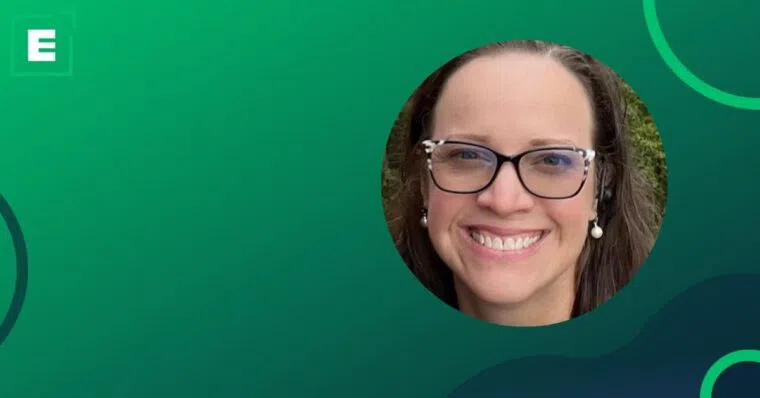“Why K12 Teachers Make Great Instructional Designers,” Edtech Mentor Karen Mahon Explains

- 1. K12 teachers are excellent communicators
- 2. K12 teachers have a deep understanding of curriculum and pedagogy
- 3. K12 teachers are experts in writing learning outcomes and activities to go with them
- 4. K12 teachers are masters at creating assessments that measure learner performance
- 5. K12 teachers are skilled in analyzing performance data
- Making the Career Transition with Emeritus
- About the Writer
There’s a good deal of interest from K12 teachers in becoming instructional designers, of late. According to the Wall Street Journal, almost 400,000 teachers have left teaching between February 2020 and May 2022. Where are they going? One direction is toward becoming an instructional designer.
The U.S. Bureau of Labor Statistics predicts that Instructional Design (ID) jobs will grow by 7% between now and 2031. This is only in education, and does not include training positions in industry. Additionally, the average salary for an entry-level position for an instructional designer in the greater Boston area, where the U.S. offices of Emeritus are based, is $64,510, whereas the average for an entry-level teacher position in the greater Boston area is only $51,881. A teacher must have seven to nine years of experience in teaching to achieve a similar base salary ($62,022) to an ID with zero to one year of experience in ID in 2023.
Although K12 teachers do require some additional training to become IDs, much of their original teacher training, as well as their on-the-job experiences, position them well for a transition to ID. We’ll discuss the necessary additional training in a future article, but for now, let’s focus on the strengths that K12 teachers have that are helpful for a career in ID.
1. K12 teachers are excellent communicators
Refined by constant communication with students, parents, and administrators, K12 teachers tend to have exceptional communication skills. They are also able to communicate effectively using a variety of channels, including verbal, written, and digital. Additionally, K12 teachers can adjust their communication style to meet the needs of their audience, as well as create and deliver presentations that are clear and concise.
2. K12 teachers have a deep understanding of curriculum and pedagogy
K12 teachers have developed an in-depth understanding of instructional methods and theories. They use this knowledge to design lessons that meet the needs of their students. They differentiate instruction to meet the diverse needs of all learners, and use a variety of instructional strategies to engage students in learning. Their commitment to lifelong learning ensures that K12 teachers are always up-to-date on the latest instructional strategies and technologies.
3. K12 teachers are experts in writing learning outcomes and activities to go with them
K12 teachers use Bloom’s Taxonomy and action verbs to write learning outcomes that are observable, measurable, and meaningful, and describe the key performances that learners must achieve. They also are familiar with creating activities that align to learning outcomes, and determining what information learners need to complete those activities successfully. This allows them to create lessons that are focused and relevant.
4. K12 teachers are masters at creating assessments that measure learner performance
K12 teachers are able to craft assessments that accurately measure student progress. Working backward from the learning outcomes, K12 teachers are adept at creating formative and summative assessments that measure the performances described by the outcomes. This skill is something that K12 teachers have in abundance, allowing them to track student progress effectively.
5. K12 teachers are skilled in analyzing performance data
K12 teachers use data from activities and assessments to inform their instructional decisions. Learner performance data drives their instructional planning, allowing them to assess student progress, identify areas of need for their students, and improve their instruction. They can quickly identify patterns and trends in student data, and are constantly looking for ways to improve student performance by analyzing data and making adjustments to instruction. They are also able to effectively communicate student performance data to parents, administrators, and other stakeholders.
Making the Career Transition with Emeritus
At Emeritus, we have numerous former K12 teachers on our Global Design team. If you are a K12 teacher who is interested in pursuing a career in ID, we’d love to help! Check out our Professional Certificate in Instructional Design, taught by our own team of instructional designers and we’ll help you get on your way!
About the Writer
Karen Mahon is Senior Director of Global Design at Emeritus. She is an educational psychologist and behavioral scientist who has spent nearly 25 years working in education and edtech, after earning her doctorate in 1998. Her specialties include performance engineering, strategy, and leadership, and she has worked in K12 (both regular and special education), higher ed, corporate training, and executive education. Her passion lies in creating effective and meaningful learning experiences in which success can be demonstrated by direct measures of learners’ performance change.
Karen has extensive experience in instructional design, online learning, and classroom technologies. For nearly 10 years, Karen received funding from the National Institutes of Health to develop adaptive instructional software programs; more recently she served as a mentor to edtech startups as part of the Massachusetts Institute of Technology’s (MIT) Venture Mentoring Service and was a scientific advisory board member for the Center for Innovations in Learning at Temple University. She currently serves as an advisor to the Cambridge Center for Behavior Studies.
By Karen Mahon, Senior Director, Global Design, Emeritus
Write to content@emeritus.org.





